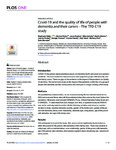Covid-19 and the quality of life of people with dementia and their carers—The TFD-C19 study
| dc.contributor.author | Daley, S | |
| dc.contributor.author | Farina, Nicolas | |
| dc.contributor.author | Hughes, L | |
| dc.contributor.author | Armsby, E | |
| dc.contributor.author | Akarsu, N | |
| dc.contributor.author | Pooley, J | |
| dc.contributor.author | Towson, G | |
| dc.contributor.author | Feeney, Y | |
| dc.contributor.author | Tabet, N | |
| dc.contributor.author | Fine, B | |
| dc.contributor.author | Banerjee, Sube | |
| dc.date.accessioned | 2022-03-04T12:18:28Z | |
| dc.date.issued | 2022-01-19 | |
| dc.identifier.issn | 1932-6203 | |
| dc.identifier.issn | 1932-6203 | |
| dc.identifier.other | e0262475 | |
| dc.identifier.uri | http://hdl.handle.net/10026.1/18886 | |
| dc.description.abstract |
<jats:sec id="sec001"> <jats:title>Introduction</jats:title> <jats:p>COVID-19 has placed unprecedented pressure on dementia health and social care systems worldwide. This has resulted in reduced services and support for people with dementia and their family carers. There are gaps in the evidence on the impact of the pandemic on Quality of Life (QoL). We carried out a study on the impact of the pandemic on the QoL of a group of people with dementia and their family carers who were part of a larger existing cohort study.</jats:p> </jats:sec> <jats:sec id="sec002"> <jats:title>Methods</jats:title> <jats:p>We quantitatively measured QoL, on two occasions during the two national lockdowns in 2020 and compared these data with those obtained when they entered the study (before the pandemic). Measures used included: DEMQOL-Proxy, Clinical Dementia Rating Scale and C-DEMQOL. To understand how QoL changed over time, a repeated measures ANOVA was run for each dependent variable with the following variables entered as co-variates: duration in study, baseline dementia severity, gender of the family carer, gender of the person with dementia, family carer relationship, dementia type, living status, age of the person with dementia, and age of the family carer.</jats:p> </jats:sec> <jats:sec id="sec003"> <jats:title>Results</jats:title> <jats:p>248 participants took part in the study. QoL scores did not significantly decline between either time period for the person with dementia or their family carer. There was variation in subgroups; with co-resident status, carer relationship, gender of the person with dementia, age of the person with dementia, and baseline cognitive status influencing QoL outcomes in family carers.</jats:p> </jats:sec> <jats:sec id="sec004"> <jats:title>Discussion</jats:title> <jats:p>It is striking that people with dementia and their carers did not report a decline in QoL during the pandemic or in the months following restrictions suggesting the possibility of resilience. Variation in subgroups suggests that specific groups of family carers were more vulnerable to lower QoL; indicating the need for more tailored, nuanced support during this period.</jats:p> </jats:sec> | |
| dc.format.extent | e0262475-e0262475 | |
| dc.format.medium | Electronic-eCollection | |
| dc.language | en | |
| dc.language.iso | en | |
| dc.publisher | Public Library of Science | |
| dc.subject | Aged | |
| dc.subject | Aged, 80 and over | |
| dc.subject | COVID-19 | |
| dc.subject | Caregivers | |
| dc.subject | Dementia | |
| dc.subject | England | |
| dc.subject | Female | |
| dc.subject | Humans | |
| dc.subject | Male | |
| dc.subject | Middle Aged | |
| dc.subject | Quality of Life | |
| dc.subject | Quarantine | |
| dc.subject | SARS-CoV-2 | |
| dc.subject | Severity of Illness Index | |
| dc.title | Covid-19 and the quality of life of people with dementia and their carers—The TFD-C19 study | |
| dc.type | journal-article | |
| dc.type | Journal Article | |
| dc.type | Research Support, Non-U.S. Gov't | |
| plymouth.author-url | https://www.webofscience.com/api/gateway?GWVersion=2&SrcApp=PARTNER_APP&SrcAuth=LinksAMR&KeyUT=WOS:000786483800039&DestLinkType=FullRecord&DestApp=ALL_WOS&UsrCustomerID=11bb513d99f797142bcfeffcc58ea008 | |
| plymouth.issue | 1 | |
| plymouth.volume | 17 | |
| plymouth.publication-status | Published online | |
| plymouth.journal | PLoS One | |
| dc.identifier.doi | 10.1371/journal.pone.0262475 | |
| plymouth.organisational-group | /Plymouth | |
| plymouth.organisational-group | /Plymouth/Faculty of Health | |
| plymouth.organisational-group | /Plymouth/Faculty of Health/Peninsula Medical School | |
| plymouth.organisational-group | /Plymouth/Faculty of Health/Peninsula Medical School/PMS - Manual | |
| plymouth.organisational-group | /Plymouth/REF 2021 Researchers by UoA | |
| plymouth.organisational-group | /Plymouth/REF 2021 Researchers by UoA/UoA03 Allied Health Professions, Dentistry, Nursing and Pharmacy | |
| plymouth.organisational-group | /Plymouth/Users by role | |
| plymouth.organisational-group | /Plymouth/Users by role/Academics | |
| plymouth.organisational-group | /Plymouth/Users by role/Researchers in ResearchFish submission | |
| dc.publisher.place | United States | |
| dcterms.dateAccepted | 2021-12-24 | |
| dc.rights.embargodate | 2022-3-5 | |
| dc.identifier.eissn | 1932-6203 | |
| dc.rights.embargoperiod | Not known | |
| rioxxterms.funder | Economic and Social Research Council | |
| rioxxterms.identifier.project | DETERMIND-C19: Impact of COVID-19 on people newly diagnosed with dementia and their family carers, a mixed method study nested in DETERMIND | |
| rioxxterms.versionofrecord | 10.1371/journal.pone.0262475 | |
| rioxxterms.licenseref.uri | http://www.rioxx.net/licenses/all-rights-reserved | |
| rioxxterms.licenseref.startdate | 2022-01-19 | |
| rioxxterms.type | Journal Article/Review | |
| plymouth.funder | DETERMIND-C19: Impact of COVID-19 on people newly diagnosed with dementia and their family carers, a mixed method study nested in DETERMIND::Economic and Social Research Council |


